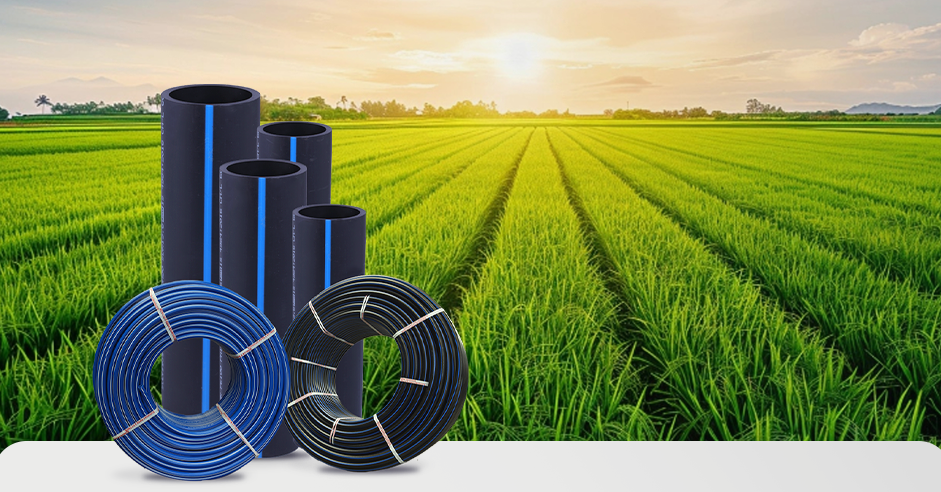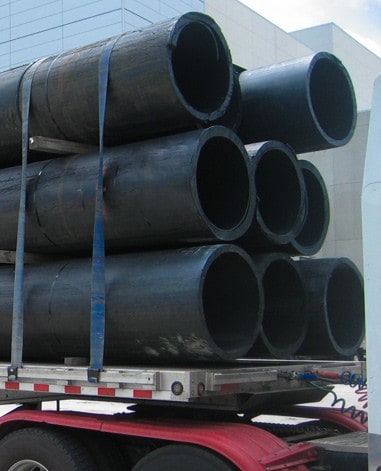How Midland TX HDPE Pipe Fittings in Stock Support Local Projects
Wiki Article
A Comprehensive Guide to the Various Uses HDPE Pipeline in Building and Industry
HDPE pipes have emerged as an essential part in contemporary building and industrial applications. Their unique residential properties, such as resistance to corrosion and light-weight style, make them appropriate for a large variety of uses. From water systems to agricultural watering, HDPE pipes supply options that enhance efficiency and sustainability. Comprehending their diverse applications is important for professionals aiming to enhance infrastructure. What particular benefits do these pipes bring to each field?Water System and Distribution Solutions
Water system and distribution systems are critical components of urban facilities, typically counting on high-density polyethylene (HDPE) pipes for their resilience and efficiency. These systems transportation potable water from treatment facilities to consumers, making sure accessibility and safety. HDPE pipes are preferred for their resistance to deterioration, chemicals, and severe temperature levels, which boosts their durability and reduces maintenance costs. Furthermore, their light-weight nature permits easier installation and transportation, making them perfect for various urban and rural applications.The flexibility of HDPE pipelines allows them to be installed in tight rooms and around barriers, decreasing the demand for considerable excavation (hdpe pipe in stock Midland TX). Their smooth indoor surface lowers rubbing losses, enhancing water circulation rates. As cities remain to grow, the need for trusted water supply systems boosts, placing HDPE pipelines as a sustainable remedy for modern-day facilities tasks. Their tested record makes them a preferred selection amongst engineers and metropolitan planners alike
Wastewater Administration and Treatment
Effective wastewater administration and therapy are necessary for preserving public health and wellness and ecological quality. HDPE pipes play a crucial duty in this process due to their longevity, resistance to corrosion, and ability to stand up to severe chemicals. These pipelines are generally used in numerous applications, including sewer system, stormwater water drainage, and wastewater treatment facilities. Their light-weight nature assists in easier installment and transport, reducing labor expenses and time.On top of that, HDPE pipes have a smooth indoor surface area that reduces friction loss, promoting efficient circulation rates. They are additionally less susceptible to leaks and failures contrasted to traditional materials, making sure that pollutants are consisted of effectively. Additionally, their flexibility enables for versatility in different dirt problems, making them appropriate for diverse ecological setups. As industries significantly focus on lasting methods, making use of HDPE pipes in wastewater management systems straightens with objectives for reducing environmental influence and boosting resource healing.
Agricultural Irrigation Solutions
In agricultural setups, reliable watering solutions are essential for optimizing crop yields and managing water resources. HDPE (High-Density Polyethylene) pipelines play an important duty in modern watering systems as a result of their durability, adaptability, and resistance to deterioration. Their capability to endure high pressures makes them suitable for both surface and subsurface irrigation applications, making sure consistent water circulation across areas.Farmers can use HDPE pipes in drip watering systems, which supply water directly to plant roots, minimizing wastage and promoting healthy and balanced growth. In addition, these pipelines are light-weight and very easy to install, minimizing labor costs and installment time. Their long life-span and reduced maintenance needs even more boost their allure in farming practices.
Moreover, HDPE pipelines are eco-friendly, as they can be reused and do not leach damaging chemicals into the dirt. This makes them a lasting selection for farmers intending to take on green farming approaches while optimizing productivity.
Industrial Applications and Procedures
Flexibility is a characteristic of HDPE pipelines, making them vital in various commercial applications and procedures. These pipelines are widely made use of in chemical handling industries due to their outstanding resistance to a large range of corrosive materials. HDPE's light-weight nature, integrated with high tensile stamina, enables simple setup and lasting efficiency sought after atmospheres.In the oil and gas sector, HDPE pipelines play an essential role in transferring hydrocarbons and gases, many thanks to their toughness and flexibility - Midland TX HDPE Pipe Fittings in Stock. Furthermore, they are employed in mining procedures for the transportation of slurry and other materials, where traditional piping systems might fall short
HDPE pipelines are progressively used in manufacturing facilities for water supply lines and wastewater administration. Their capability to stand up to severe temperatures and stress makes them ideal for a range of commercial processes. On the whole, HDPE pipes contribute greatly to efficiency and safety and security across varied industrial applications.
Stormwater Management and Drainage Equipments
Stormwater administration and drainage systems are important elements in metropolitan facilities, designed to manage excess rains and decrease flooding risks. High-density polyethylene (HDPE) pipelines are increasingly utilized in these systems as description a result of their resilience, adaptability, and resistance to rust. These pipes effectively move stormwater away from booming locations, reducing surface area overflow and avoiding waterlogging.HDPE's light-weight nature helps with less complicated setup, lowering labor expenses and construction time. In addition, its resistance to chemicals and ecological stressors assurances long life and dependability in numerous environments. Along with traditional drainage applications, HDPE pipelines are also employed in innovative services such as environment-friendly facilities, which includes rainfall yards and absorptive sidewalks.

Regularly Asked Questions
Just How Does HDPE Pipeline Compare to PVC Pipe in Cost?
As a whole, HDPE pipe has a tendency to be a lot more pricey than PVC pipe as a result of its boosted toughness and flexibility. Nonetheless, long-term expense considerations, such as maintenance and life-span, may prefer HDPE in details applications.
What Is the Life Expectancy of HDPE Piping Under Varying Problems?
HDPE pipelines generally have a life expectancy of 50 to 100 years, depending upon environmental problems, installment methods, and usage. Elements such as temperature, dirt kind, and exposure to chemicals can significantly affect their longevity.Can HDPE Piping Be Recycled After Use?
Yes, HDPE pipelines can be reused after use. The reusing process includes thawing down the material, permitting it to be repurposed into brand-new items, thereby promoting sustainability and reducing environmental effect associated with plastic waste.Are There Any Specific Installment Difficulties With HDPE Pipelines?
Installation challenges with HDPE pipes consist of proper jointing techniques, guaranteeing ample trench problems, and handling thermal development. Additionally, proficient labor is required to take care of specialized devices, which can make complex the installment procedure in numerous atmospheres.
What Accreditations Should I Search For When Getting HDPE Pipings?
When acquiring HDPE pipes, one should look for certifications such as ASTM, AASHTO, and ISO, which confirm high quality websites and compliance linked here with sector requirements, guaranteeing resilience and performance in different applications. - Pipe Manufacturing Midland TXReport this wiki page